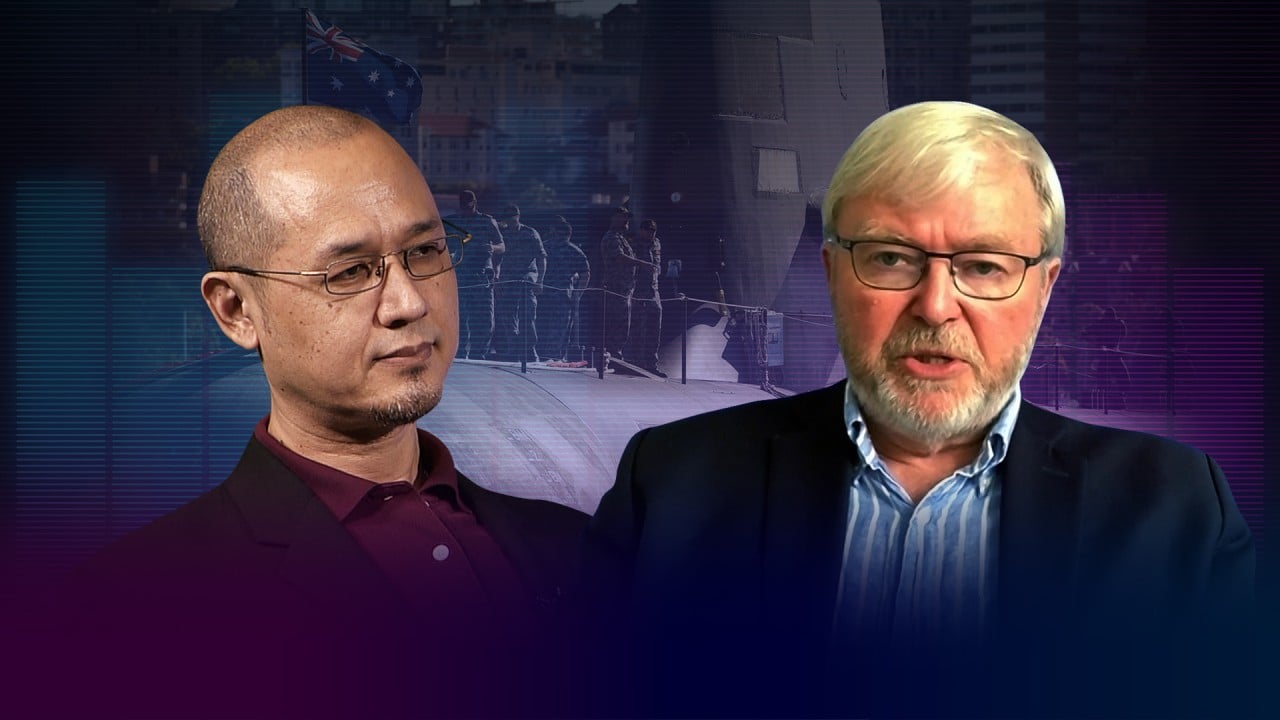
23:20
Talking Post: Kevin Rudd unpacks the risk of war between China and the US with Yonden Lhatoo
Australia-China ties are frayed, but Canberra’s softening relations with Southeast Asia more of a worry: former PM Rudd
- Rudd says Canberra has put more emphasis on collaboration with the US amid Beijing’s rise than on engagement with its regional neighbours
- This needs to be stepped up, he says, noting that ‘the fulcrum of Australia’s long-term strategic interests in Southeast Asia’ is its relationship with Indonesia
Australia is reopening, but pandemic limbo remains for international students
Since the fallout, China has disrupted trade with Australia while Canberra has shored up its alliances with allies such as Washington and London. Under the recent Aukus security pact, the US and Britain will help Australia acquire nuclear-powered submarines, in what is seen as an effort to counter Beijing.
Rudd said Australia’s encounters with China were not unique as many American allies in East Asia had a “parallel dilemma”.
“In terms of the management … of Australia’s strategic interests, my argument has always been that we need to balance both our continued military collaboration with the US, who have been close allies of ours for about 100 years, [and] at the same time, deepen our diplomatic and economic engagement with all countries within the region,” he said.

“If I have a critique in terms of the posture of the current Australian government, it emphasises the first and does not emphasise the second. I am concerned, for example, that Australia’s current engagement with Southeast Asia is not as strong as it was in previous periods of Australian governments.”
The case for Australia to step up ties with the neighbouring region was also argued in a foreign policy last year by Hervé Lemahieu, director of research at the Sydney-based Lowy Institute think tank.
With Australia’s prosperity tied to the security of the Indian and Pacific oceans as well as maritime and continental Southeast Asia, he wrote, it was key that Canberra worked with the middle powers of the region.
Australia still open to Chinese investors despite tensions, but security key
“Navigating a path through the US-China competition and forging constructive ties with its Southeast Asian neighbours are among Australia’s most pressing foreign policy priorities,” Lemahieu said in the paper. “This is often driven in both directions by a failure to understand, or simply the urge to gloss over, fundamental differences in identities, temperaments, priorities, and alignments between Australia and its Southeast Asian counterparts.
“What is needed from Canberra is a more tailored approach to working with the middle powers of Southeast Asia – one that takes greater stock of their development needs, and is not exclusively couched in terms of competition with China.”

Neil Thomas, an analyst with political risk consultancy Eurasia Group, agreed, saying that in trying to achieve any of its China policies, Canberra would be better off cultivating a stronger alliance with the neighbouring region.
“Southeast Asia is a pivotal region for US-China strategic competition, for international trade, for diplomacy … even if there was no US-China competition, it is always going to make sense [for Australia] to improve relations with Southeast Asia,” he said, adding that as an example, Australia could have, after briefing France about Aukus, informed various countries in the region.
“I’m particularly concerned that our relationship with Jakarta has been drifting over quite a number of years now. Nothing dramatic, just long-term drift,” he said. “The bottom line is the Australia-Indonesia relationship requires continuing, weekly high-level engagement at the political, military, economic, commercial, and financial levels. I’m not convinced that is occurring.
China’s clampdown on new coal plants will hit these Asian countries hardest
“The fulcrum of Australia’s long-term strategic interests in Southeast Asia hinge on the strength of our relationship with Jakarta.”
One step Australia could have taken, he added, was to have increased its support of Indonesia during the pandemic.
Lemahieu also said Canberra could demonstrate a deeper commitment to Southeast Asia through deploying pandemic-related development assistance to vulnerable countries, particularly those in the Mekong region.
Late last year, the Australian government pledged more than A$550 million (US$402 million) towards Covid-19 recovery and other development programmes in Southeast Asia. It also extended a A$1.5 billion (US$1.1 billion) loan to Jakarta to battle economic woes.
But politicians such as Labor MP Josh Burns this week said more could be done for Australia’s friends such as Indonesia, including the donation of spare AstraZeneca vaccines.
“It would be negligent to hold on to the millions of spare AstraZeneca doses while friends are battling this pandemic without enough protection. From a purely self-interested perspective, Indonesia is a close neighbour, friend, strategic partner, and the world’s third largest democracy,” Burns wrote in a piece for the Lowy Institute this week.
Weaknesses in Australia’s relationship with Indonesia, particularly economic cooperation, have not gone unnoticed.
This week, in an article for the East Asia Forum, Eko N.M. Saputro, a senior policy analyst at the Indonesian Ministry of Finance, said while both countries had committed to improving bilateral relations – as reinforced in their 2018 comprehensive strategic partnership – much of their economic dialogue seemed to be “officials-heavy forums that lack inclusivity”.
“Except for academics, the participation of non-state actors remains scant,” he wrote. “There are still many non-government economic actors that could enhance bilateral relations between the two countries, yet remain excluded.”

